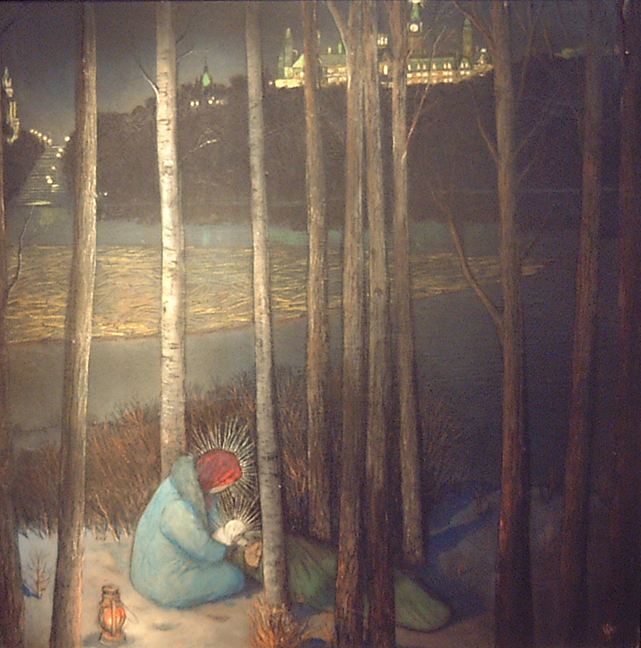December 7: At the Margins
♫ Music:
For you know the grace of our Lord Jesus Christ, that though He was rich, yet for your sake He became poor, so that you through His poverty might become rich.
2 Corinthians 8:9
AT THE MARGINS
The artist, William Kurelek, describes the scene: “The sky is starless, and snow threatens again. In the dark river below a boom of logs floats. Across the river a light shines in the tower of the capital, announcing to the country that its representatives are inside deliberating” (Kurelek, 1976, 9). Ottawa’s Parliament Buildings represent the focal point of power and self-importance; yet, this is not what captures our attention. Instead, we are invited to ponder a curious scene unfolding in the wintery woods below. On the edges of the capital, oblivious to the rich and powerful on “the hill,” Mary is kneeling in the snow beside a sleeping homeless person. Astonishingly, she is holding the baby Jesus just close enough for him to reach out and gently touch the person’s forehead. Emmanuel, the Son of God, identifies with the poverty and frailty of our humanity. And He appears in unexpected places, in unexpected ways.
The accompanying chorus echoes a refrain:
O, poor little Jesus,
This world gonna break your heart.
There'll be no place to lay your head, my lord.
That Christ relinquished His glory, all that was His “due," is at the heart of the Christmas message: “that though He was rich, yet for your sake He became poor” (2 Cor. 8:9). Arriving as a defenseless human baby in a stable, on the edges of society - homeless and away from the grandeur and acclaim He deserved as the King of Kings - confronts all our notions of “entitlement” (Phil. 2:6-8).
Indeed, Jesus conducted much of His work and ministry at the margins (in Galilee and Samaria, rather than Jerusalem) and outside of the prevailing power structures, “on the road, by the sea, in the fields, on the mountain, by the well” (Eckblad, 2005, p. xv). At the margins, we often find those who are overlooked, hidden, forgotten by mainstream society and far from places of prominence. Yet, Jesus is here – empowering the weak, rescuing the oppressed, befriending the “stranger,” healing the diseased, and redeeming the sinner: “so that you through His poverty might become rich” (2 Cor. 8:9).
While our 21st century globalized world boasts of unprecedented progress and unimaginable wealth in some corners, Emmanuel reaches out to those in the shadows of wealth and privilege, outside the realm of the expected. He identifies with those most “unlikely” to succeed – but through His grace, He provides a way that they, and that we, might experience life more abundantly (John 10:10). O come, O come Emmanuel – God with us – and our eternal home (Matt. 1:23, cf. Rev. 21:3).
Rhonda McEwen, Associate Professor of Intercultural Studies
References
Eckblad, B. (2005). Reading the Bible with the damned. Louisville, KY: Westminster John Knox Press.
Kurelek, W. (1976). A Northern Nativity: Christmas Dreams of a Prairie Boy. Plattsburgh, NY: Tundra Books.
Watch, O LORD, with those who wake, or watch, or weep tonight, and give Your angels charge over those who sleep. Tend Your sick ones, O Lord Christ. Rest Your weary ones. Bless Your dying ones. Soothe Your suffering ones. Pity Your afflicted ones. Shield Your joyous ones. And all for Your love's sake. Amen
Augustine of Hippo
Ottawa Unaware, 1975
William Kureleck
From the Ahmanson Collection
About the Artist and the Art
William Kurelek (1927 – 1977) was a Canadian artist and writer. His work was influenced by his childhood on the prairies, his Ukrainian-Canadian roots and his Roman Catholic faith. He died of cancer in Toronto in 1977. Kurelek painted many modern nativities showing Christ being born in a wide variety of settings to many different ethnicities. Most often Kurelek’s nativities occurred in northern landscape settings. He depicted the Christ child being born to Eskimos, to Indians, to Blacks. He painted the Nativity taking place in a fisherman’s hut, a garage, a cowboy’s barn. In his work, the holy family is given refuge in a city mission, a grain barn, and a country school. Ottowa Unaware shows the bright nightlights of the city while focusing on a homeless Mother and Child, hovering alone on a frigid wintery night.
Website: http://kurelek.ca/
About the Musician
Odetta Holmes (1930 – 2008), known as Odetta, was an American singer, actress, guitarist, songwriter, and a civil and human rights activist, often referred to as "The Voice of the Civil Rights Movement.” Her repertoire consisted of folk, blues, jazz and spirituals. Odetta influenced many of the key figures of the folk revival of that time. Martin Luther King called her “the queen of American folk music.”
Website: http://www.allmusic.com/artist/odetta-mn0000888730
About the Music
Spirituals are Christian songs created by enslaved African-Americans to help them cope with life. This well-loved Christmas spiritual is powerful because it reflects a rawness and honesty that most Christmas music avoids. Slaves were able to identify with the poverty and makeshift conditions the Lord of All encountered His first night on earth and to ponder why the Lord of the Universe would choose to dwell among the poorest of the poor.
Poor Little Jesus Lyrics
Wasn’t that a Pity
Wasn’t that a Shame
Wasn’t that a Pity an’a Shame
Well its Poor little Jesus,
born on Christmas oh my love
Born on Friday
Well its Poor little Jesus,
Son of Mary oh my love
Didn’t have no cradle
Well its Poor little Jesus,
didn’t have no cradle, oh my love
Laid in a manger|
Well its Poor little Jesus,
laid him in a manger, oh my love
Couldn’t find no hotel room
Well its Poor little Jesus,
Son of Mary, oh my love
Born on Christmas
Wasn’t that a Pity
Wasn’t that a Shame
Wasn’t that a Pity an’a Shame
